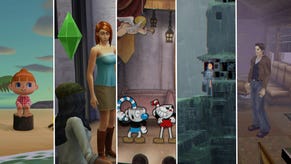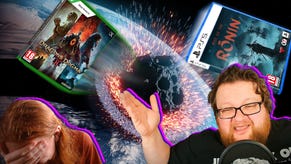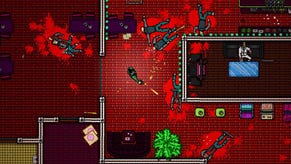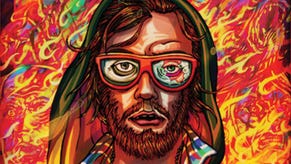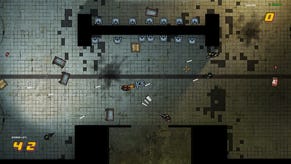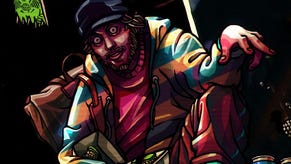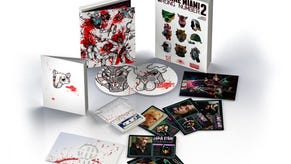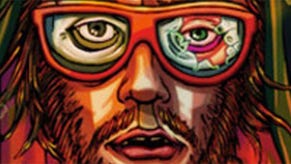Hotline Miami interview: have you met the new guy?
Hotline Miami is the gritty crime title from Dennaton Games. VG247's Dave Cook spoke with creator Jonatan Söderström to discuss the game's development and his brush with piracy.
How do you get a job in the games industry? To the freshly graduated coder or designer, the sector may appear to be an impenetrable fortress under the command of big players like EA or Activision. But if you look closely at current trends, you'll see that people have begun to dig under its walls and into the compound, essentially creating their own back door.
New routes to market have opened. It isn't mandatory to serve for years on a studio's food chain, slowly rising up the ranks to the position you think you deserve. You can create that role for yourself. Several heavyweight figures have begun weighing in on this scene, offering their own expertise to aspiring developers.
Peter Molyneux is an avid champion of self-styled developers, Valve's Chet Faliszek has recently been giving lectures on the topic, and prominent names like ex-Infinity Ward community man Rob Bowling have broken free of the triple-a sector to set up studios on their own.
It's inspiring, but the notion that going into business for yourself is easy is nothing more than illusion. Working independently - in any industry - is hard, risky work, and recently, no one has signified this more than Hotline Miami creator Jonatan Söderström.
Just last week, Söderström revealed that his game - the critically acclaimed 1980s 'f**k-'em-up' Hotline Miami - was suffering rampant piracy on The Pirate Bay. Rather than shut the download links down, he gave the community the most recent version that rang true to his desired standard of quality.
It was an admirable move, but a rather sad one at the same time. It was almost like an admission of defeat, a realisation that piracy - gaming's largest elephant in the room - cannot be strong-armed out the door.
Should the industry just learn to live with it? Does it not counter the supposed 'golden age' figures like Molyneux, Faliszek and Bowling so avidly champion? Perhaps more should be done to safeguard fledgling coders and teams, because after all, you never know which one of these new developers could go on to become the next Valve, given the chance.
Don't laugh it off, it could happen, and we should be supporting the idea, all of us. That said, not everyone suffers the same hardships when entering game development. But if it isn't piracy, then it's the staggering cost involved with getting indie games on XBLA or PSN, or strenuous development costs.
Or if it isn't that, it's the difficult odds of making your money back on iTunes or Android's marketplace. With so many new coders and teams entering the development gold rush, submitting a game on App Store becomes a wind-p**sing exercise. Things need to change.
To self-inflict insult to injury, Söderström revealed on Twitter that he had been broke for some time while developing Hotline Miami, so VG247 simply had to arrange a chat with him to find out what it feels like to be part of a small team entering an industry crawling with parasites and hidden dangers.
What has been your reaction to the critical reception of Hotline Miami so far? People really seem to have really taken to it.
Jonatan Söderström: I'm really happy about it, as we didn't know quite what to expect when we released the game, so it was really nice to see people enjoying it.
That's excellent. I want to also try and get a feel for where the concept of the game came from, and how you took those initial steps to get the project rolling.
It started when I made a prototype back in 2007 I think, and we were looking for something quick to do this year – back in Spring. So I showed the prototype to Dennis and he really liked it, so he took a few days and started just drawing graphics for the game.
He showed this to me, and then I started putting another prototype together, and it turned out really well so we just kept working on it. We then got in touch with Devolver Digital and things sort of got out of hand from there.
”I’m not making games to make money. I do want to make money, but it’s not my major intention with my creativity. I just like expressing myself, making cool stuff, and like, if you don’t want to pay for the game but want to play it anyway, I’m not going to stop people from doing that.”
It was only meant to be a small project from the start, but suddenly we just kept coming up with new ideas and kept wanting to make a bigger game.
And how have you responded – personally – to the overnight success and notoriety of the game?
I'm not sure I quite grasp what's happening right now, so I'm just focusing on working on the game, making sure it works the way we intended it to, and then I guess it will sink in across the next couple weeks.
We saw last week that you were helping people who were torrenting the game on The Pirate Bay, by offering them the patched version. That must have been tough.
Yeah. I'm not making games to make money. I do want to make money, but it's not my major intention with my creativity. I just like expressing myself, making cool stuff, and like, if you don't want to pay for the game but want to play it anyway, I'm not going to stop people from doing that.
I prefer if they play a version of the game that isn't bugged out, so they get a good impression of it. I don't want people to pirate the game or anything like that, but I know it's an issue and there's nothing we can do about it. I'm not sure I want to do anything about it, but I just want want people to enjoy the game.
Regardless of whether or now we can stop piracy, we did see you mention on Twitter that you've been 'broke' for a while. Is the plan then to recoup your investment and perhaps get the game out on other platforms?
I want to make enough money to make bigger games, and that' probably not something I'm able to do if I have to get a job, and of course I want to be able to pay rent and buy food from what I do. So, we're looking to make another game as soon as possible, and hopefully it will turn out as good as Hotline Miami.
I think a lot of people don't realise just how 'all or nothing' game development is. Like, you can't do a part-time job and be a seriously dedicated developer at the same time. Is it true that you can only really focus on one or the other?
I think you can still make games as a hobby, but it's very time-consuming. The more work you put into it, the more you have to work yourself to put back into the project – because it becomes a hurdle to get into it when there are so many things going on.
It starts to become more like work after a while once it's nearing completion, because there's the last boring bits left to do, and it's easy to just feel like you don't want to do it any more. So it's good to have some kind of motivation, such as being able to make money off it, and to see some good come out if that isn't just letting people play it for free.
Regarding the game itself, why did you decide to set it in the 1980s – GTA: Vice City thematic parallels aside of course?
I grew up watching a lot of movies and stuff from the '80s, a lot of ultra-violent stuff. Then when I saw Drive, it drew a lot of vibe from that era but made it feel more modern, while putting emphasis on the stylish bits of the '80s. That was a really big inspiration.
"Part of learning the game means exposing yourself to danger a lot so you can figure out how to tackle every situation in the game. We looked at Meat Boy for that part of the game, and we thought it had a good flow, and allowed people to master it without feeling too punished..”
It felt like a really fresh take on something old,and it seems like a lot of games are nostalgic and look back at what happened during the early days of game development. I wanted to make a fresh take on that, not to just re-produce it, and we wanted to figure out a way to do the '80s thing while feeling fresh and modern at the same time.
It has a lot in common with Super Meat Boy in terms of both difficulty, and the ease of restarting and attempting your run again in an instant.
Yeah, both me and Dennis wanted to make a challenging game that still felt like it was fair, like, you could still beat it in a reasonable amount of time, and you didn't feel punished for failing a couple of times.
Part of learning the game means exposing yourself to danger a lot so you can figure out how to tackle every situation in the game. We looked at Meat Boy for that part of the game, and we thought it had a good flow, and allowed people to master it without feeling too punished.
If you take a game today and compare its challenge to something like – I don't know – Pac-Man or Donkey Kong, those are two very different styles of challenge. Was Hotline Miami a comment on the coddling nature of some games today?
I guess some game developers are afraid that some people will be intimidated by a game that doesn't hold the player's hand too much. I think in some ways there is a good reason for that, like, if people don't understand how to play your game then that's a bad thing.
But when it comes to difficulty it doesn't have to be a bad thing that the player doesn't immediately get what to do, or how to do it, that they have to go through a learning curve before they can play the game the way it's meant to be played.
One thing some players have found hard to grasp is the line of sight mechanic. Was that a tricky thing to code?
Coding it wasn't that difficult, but there are a lot of things in the game that I'm not sure are apparent – like game design choices – like people complain about the enemies being stupid and not noticing if they pass a dead body or something like that.
We had thought about all of that stuff, but we decided not to add it because it made the game more difficult. If enemies reacted to bodies and started chasing you, or like, hearing other enemies fire their guns – if they reacted to that it would have made the game harder and less fun to play.
Game design-wise it's been a little bit difficult getting everything right in terms of how the enemies are supposed to behave, but actually coding it hasn't been difficulty. Although we had some AI problems where the path-finding wasn't working correctly.
Enemies would walk through walls and stuff like that, but it's fairly simple from a coding perspective, but maybe that's because I'm not really used to it yet.
It's set in the '80s, the decade that saw a huge influx of bedroom coders creating games off their own back and making money off their creations independently. Indies have so many routes to market now, and you have first-hand experience of that. Is the industry coming full circle?
I guess so, but I haven't really thought about it to be honest. But yeah, that sounds like it's true. I like a guy called thecatamites who made a game called Space Funeral, which is a really strange RPG game.
You can't see any influences from it in Hotline Miami but it's been very inspiring because you can feel the creativity and fun that was had while making the game.
I guess that's the only parallel you can pull between this game and that. We had fun making this game, and we wanted to create an interesting world and let our imaginations run wild without conforming to any pre-defined game standards.
Indies do have more options open to them today, and given that freedom, do you think the barriers to indie console development will have to come down going forward?
I would hope they do come down a little, but I'm not sure what to expect from the future. I'm not really thinking too much about that stuff, and I just let whatever happens happen.
What are your plans for the Hotline Miami IP in the near future in that case?
We have a sort of sequel, but we'll probably release that as DLC. We would like to start working on that and have it explain the storyline a little bit more and maybe expanding a bit on the gameplay. We're thinking about doing a level editor as well. It would be cool to put the game out on consoles, but for technical reasons – it was made in GameMaker – it's not very easy to port to another system.
We did see that you were pondering a PS Vita version. Is that on the cards potentially?
We've talked about it at least, but I'm not sure how far into talking with Sony we are. It would be cool but I'm not sure it's going to happen at the moment.






